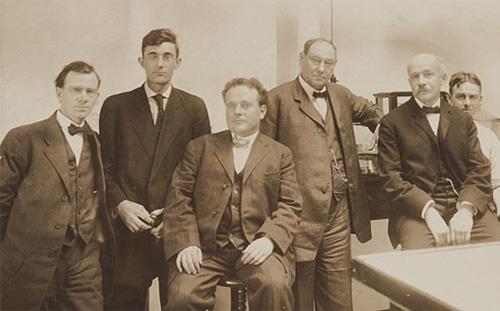
No one likes government regulation. No, sir. It's bureaucrats getting in the way of productivity. When leaders kill burdensome regulations, the people cheer.
Except there's this thing that people like even less than regulation. It's children dying because there was no regulation.
People are funny that way.
The Poison Squad, a two-hour documentary that premieres Tuesday at 9 p.m. ET on PBS' American Experience series (check local listings), tracks the fascinating and largely forgotten story of how, more than a century ago, the U.S. government was forced to start overseeing food safety.
The Poison Squad, based on the book by Deborah Blum and written and directed by John Maggio, is titled for a group of volunteers who became human trial subjects, knowingly ingesting many of the additives that were common in processed food by the late 19th century.
Their reports on the symptoms they developed formed the basis for a series of government reports on the dangers of these additives, which included the likes of formaldehyde, copper sulfate, and various acids.
Interestingly, the Poison Squad itself is not the focal point of this documentary. While these volunteers were selfless heroes, here they are more like essential supporting players to Dr. Harvey Washington Wiley, the chemist whose lifelong crusade for the regulation of adulterated food led directly to the first consumer protection legislation in American history.
That would be the Pure Food and Drug Act, signed by President Theodore Roosevelt in June 1906.
Passed over the loud, bitter, and threatening objections of the meat-packing and other major industries, the Pure Food and Drug Act, and its companion Meat Inspection Act, launched the chain of regulatory advances that are the reason we can trust most of the canned, bottled, frozen, and packaged food products we buy today.
The Poison Squad notes that we now take that kind of trust for granted, a common byproduct of a system that works. Narrator Corey Stoll does not specifically warn that we may, therefore, assume we don't need regulatory legislation anymore, but at a time when we are seeing a steady stream of significant rollbacks, that's certainly one of the potential implications.
The Poison Squad focuses more on just how compromised and adulterated processed food had become by the late 19th century when there was zero regulation.
As America moved at breakneck speed from a rural agricultural economy to an urban industrial economy, a whole processed food industry sprang up to serve consumers who were not in a position to produce their own.
The basic logistics of this industry required preservatives, some of which actually preserved food and some of which simply camouflaged its precarious condition.
Much of the milk sold in cities contained formaldehyde. Much of the "butter" was oleomargarine, the pureed leftovers from slaughterhouses. Canned vegetables were brightened with copper sulfate. "Coffee" was most often a blend of chicory, sawdust, and ash.
Even products that weren't deadly were not really the products at all. An estimated 90% of the "honey" and "maple syrup" was flavored corn syrup.
The processed food industry shrugged all this off, even in the wake of documentation that children were getting sick and dying from its products.
But eventually, it made a couple of mistakes. The meat-packing industry, controlled by giants Armour and Swift, sold the government huge quantities of rancid meat for distribution to troops fighting in the Spanish-American war.
The Army didn't care, it turned out, but some of the meat was sampled by an officer named Theodore Roosevelt, who said afterward that "I'd rather eat my hat."
When Colonel Roosevelt became President Roosevelt, he pushed for the Pure Food and Drug Act and the Meat Inspection Act, defying the long-successful objections of food industry lobbyists.
So The Poison Squad has a mostly happy ending. Not only did the government realize that food regulation was necessary, to the immense benefit of everyone who ate food, but the food industry itself gradually accepted that it could build a better, more loyal and longer-lived client base if it didn't sell them poison.
In any case, the star of The Poison Squad remains Wiley, who began his crusade against lethal food as a professor at Purdue University and went on to spend 30 years as the Agriculture Department's chief chemist.
It was in that position that he commissioned the Poison Squad itself and also conducted ever-more-sophisticated tests to detail exactly what the food industry was putting into food.
While his decades-long battle was always uphill, he eventually enlisted the support of other groups in the various progressive movements of the day, including women's suffrage and labor unions. With a tremendous boost in 1906 from the publication of Upton Sinclair's muckraking meatpacking industry exposé The Jungle, they won. And finally broke the hold of the food industry on a Congress that really didn't like all these burdensome government regulations.